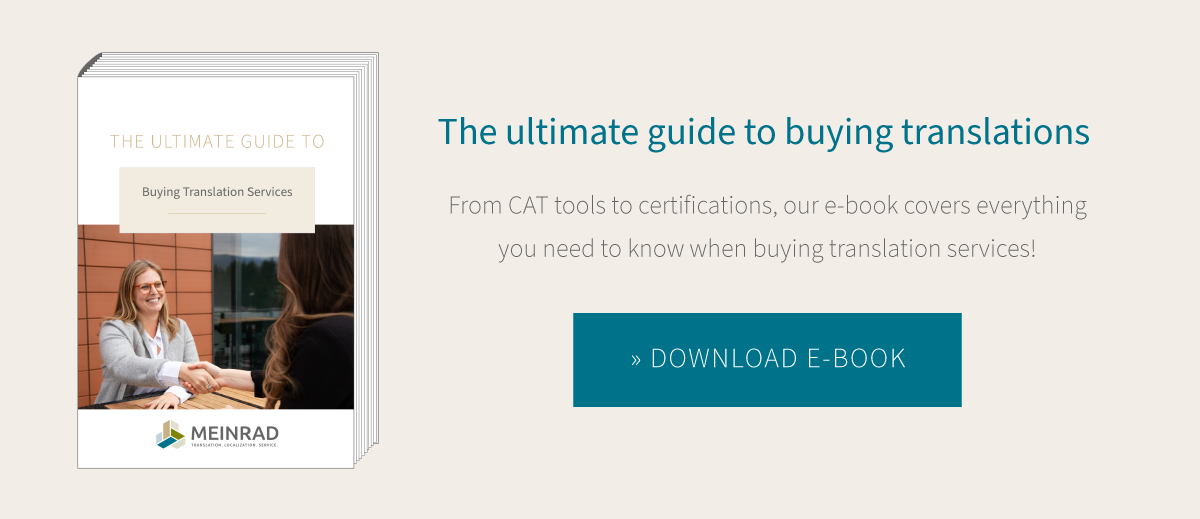 If you’re about to embark on the search for the right translation partner for your business and your needs, you need to know what you’re looking for. It may feel like you’re stumbling around in unknown territory with the various translation agencies you can find online (not to mention all the freelance translators you might have come across).
If you’re about to embark on the search for the right translation partner for your business and your needs, you need to know what you’re looking for. It may feel like you’re stumbling around in unknown territory with the various translation agencies you can find online (not to mention all the freelance translators you might have come across).
So we’ve put together 6 key questions to ask a translation agency before you decide to work with them.
1. Who are the translators the agency works with?
Try to find out which criteria the agency uses to select its external translators, and whether these criteria meet your quality requirements. Good starting points are:
- How does the agency check a translator’s claimed expertise? Does the agency simply accept what’s written on a CV, or do they check the qualifications and references it contains? Even better, do they insist on talking to the translator in person and asking them specific questions about their experience?
- How well do the project managers know their core translators? The closer the relationship, the better the project managers can assess their translators/reviewers and manage their projects accordingly.
2. How does the agency work with its translators?
- How are projects assigned? Some agencies send out projects to hundreds of translators, and the projects are assigned to whoever clicks “Accept” in the job offer first. If you’re looking for high-quality translations, these agencies are best avoided.
- What technical support do translators get? Are translators left to fend for themselves, or does the agency offer technical support to make their work as easy and stress-free as possible?
- Does the agency encourage translators to ask questions? A good translation agency will always encourage its translators to ask questions if there are parts of translations they’re unsure about. The only way to guarantee a correct translation in terms of style and content is if all doubts have been resolved.
3. What technical expertise do the project managers have?
This is especially important if your translation projects are technically complex, e.g. if they involve website localization or translating online help guides.
- Expertise with your software. Your translation partner should be familiar with the tools you use every day. Whether it’s MadCap Flare, FrameMaker or even just Microsoft Excel, the better their project managers know your needs, the better they can prepare your texts for translation and deliver the finished translations.
- Expertise with CAT tools. CAT tools such as memoQ allow your translation partner to save you money and accelerate the translation process.
4. How does the potential translation partner handle terminology?
If you already actively manage your terminology – congratulations! You can consider yourself part of a small elite who understand the value of terminology and have a terminology management system in place. Your translation partner should care as much about your terminology as you do, and train its translators, reviewers and project managers in how to use and maintain term bases.
If you’re looking to get started with terminology management – make sure you ask your translation partner how they can support you. If they’re up to speed with the latest technology, they may be able to offer software integration or help you take your first steps in collating and managing terminology.
5. Can I see their ISO 17100 certificates?
Unfortunately, many language service providers play fast and loose when it comes to the ISO 17100 seal. You’ll often see publicity material saying that they “meet all ISO 17100 requirements” or “work in accordance with ISO 17100 requirements”. If they were being honest, they would say “we aren’t certified, but we act as if we are”.
If an agency has ISO certification, they will have the corresponding certificates and will be glad to show them to you on request. Find out here how you can benefit from ISO 17100 certification.
6. Are there references from existing clients?
The experience existing clients have had can be very helpful when choosing a translation agency. References on the agency’s website give a useful insight into how they work, and which positive aspects their clients particularly appreciate.
But unfortunately it’s pretty easy for an agency to create fake references, so dig deeper: ask if you can contact the people who wrote the references personally. Not all of them will consent to this, of course, but one or two almost certainly will – and talking to them can tell you a lot about whether the translation agency is right for you.
In short – keep asking questions!
Any translation agency worth its salt can produce glossy publicity material, so take care when choosing your translation partner and ask as many questions as possible. It’s not just about finding the best translation service provider – there’s no such thing as a one-size-fits-all translation partner. Instead, it’s about finding the partner who’s the right fit for your business, your needs and your workflows.
Main image: © Andrey Popov/Adobe Stock


